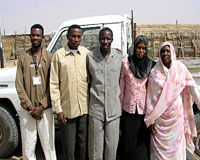
Contact: Amy Barry, +44 (0)1865 47231, +44 (0)798066439, abarry@oxfam.org.uk; Sam Barratt, Head of Media, +44 (0)1865 472466, 07818 406050 cell, sbarratt@oxfam.org.uk; both with Oxfam
DARFUR, Mar. 30 /Standard Newswire/ -- In Kalma camp in
Photo: Oxfam Public Health Promotion (PHP) team Credit: Alun McDonald/Oxfam
It was during the holy month of Ramadan that Magda's village was attacked. Survivors say armed men rode in on camels and
Magda, 23, and her three other young children fled to the nearby
"The area is not safe. Who can protect us? They can attack us whenever they want," says Adam Juma, one of the village Sheikhs.
Adam and the other Sheikhs helped bring the villagers to Kalma camp, currently home to 90,000 other people who have fled the violence in
"We arrived in Kalma with nothing," says Magda. "We had no food and no water. Just these," – she points to her tattered clothes – "and this," gesturing to the tiny tent cobbled together with straw and sticks behind her where Magda, her children, her sister-in-law and two nieces shelter each night. They sleep virtually on top of each other – to warm each other at night; to feel some semblance of safety after everything they have been through; and also because this small makeshift shelter is all they have.
Oxfam staff in Kalma are now working to ensure that Magda and the others receive support. Around 800 villagers from Amaki Sara are sheltering here in this one area on the edge of Kalma. A similar number have taken refuge in another part of the camp.
According to Adam, "There are more who hope to come. But although the journey is short, it is very dangerous."
"We are building latrines for them to use," says Abdelazim Ali, an Oxfam public health engineer in Kalma. "When new people arrive, sanitation is one of the biggest threats. Without proper latrines illness can quickly spread, especially when people are living in such basic conditions so close together."
"We are also distributing blankets and plastic sheeting to improve their shelters, and soap and jerry cans for carrying water," says Musa Dahab, Oxfam's manager in Kalma camp. Oxfam's team in Kalma is now made up entirely of Sudanese staff.
Others from elsewhere in
But for many of the most recent arrivals, their long journey may not be over. Kalma camp, with its 90,000 residents, sprawls for several kilometres along the railway line that cuts through
Most prefer to stay in Kalma, overcrowded or not. "At least we know people here," says another of the Sheikhs from Amaki Sara. "We feel a bit safer in Kalma because we have strength in numbers. Some of the villages near ours already emptied and settled here. They don't have much, but what they do have they share. They share their food with us."
The uncertainty over their future is amplified by the absence of a coordinating aid agency in Kalma. Until November last year, the Norwegian Refugee Council (NRC) filled this role, ensuring that humanitarian operations were effectively coordinated and all displaced people – including new arrivals – were most efficiently assisted and located. But NRC had to suspend its operations in
Meanwhile, all that the villagers of Amaki Sara can do is huddle together and wait.
* Some names in this story have been changed




 Sign Up to Receive Press Releases:
Sign Up to Receive Press Releases: